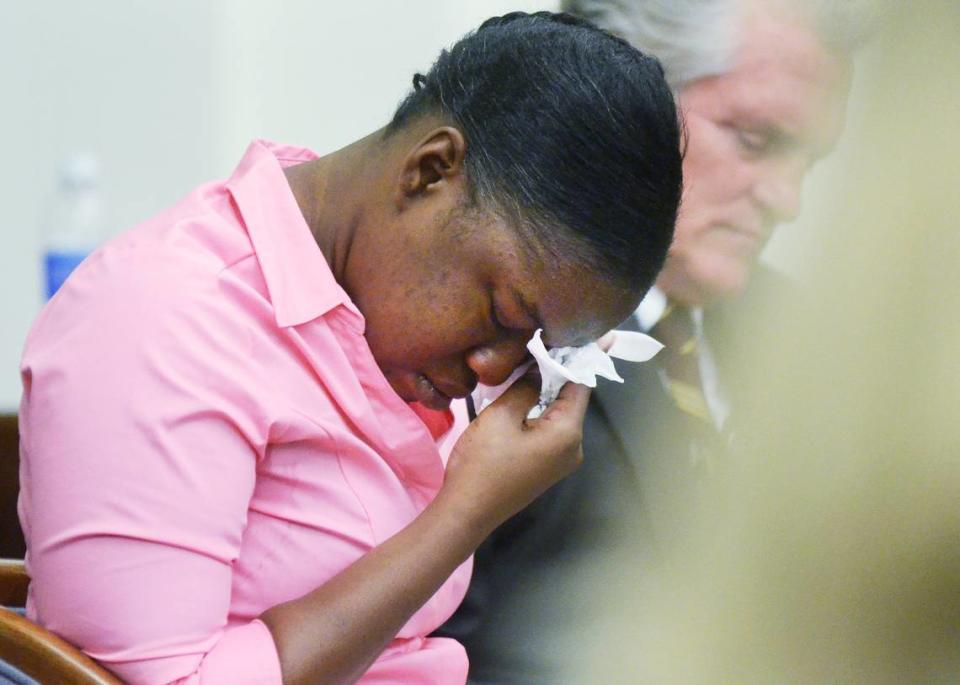Judge grants retrial for Beaufort mom convicted of throwing toddler off balcony. Is this rare?
A Beaufort mother convicted in 2014 of brutally beating, stabbing and throwing her 3-year-old daughter off a third-floor balcony will soon get another trial in the Beaufort County Courthouse.
Shayla Jerea Bryan, previously found guilty of attempted murder in 2014, has been granted a retrial by Circuit Court Judge Robert J. Bonds. She was moved earlier this month from the S.C. Department of Corrections (SCDC) to the Beaufort County jail. A new trial has not yet been scheduled.
The child survived the December 2011 attack, requiring a red blood cell transfusion and a crowd-funded rehabilitation program to regain bodily function. Her grandmother, Lavonia Bryan, took custody of the toddler following her release from the hospital.
Bryan’s guilty verdict was overturned due to issues with her previous trial, which were appealed and certified through the state’s post-conviction relief (PCR) process. Bonds approved Bryan’s PCR request April 3, ruling that the mother’s 2014 trial had not adequately considered the defense’s claims of insanity.
The insanity defense, while corroborated by opinions from the SC Department of Mental Health and two psychiatrists, did not hold up during 2014’s proceedings. Bryan’s three-day bench trial began at the Beaufort County Courthouse May 19, 2014, culminating in a guilty verdict and a 30-year sentence, the maximum allowed under South Carolina law.
But Dr. Pamela Crawford, Bryan’s longtime psychiatrist, testified in a hearing this March that Bryan suffers from schizoaffective disorder, which likely prevented her from distinguishing right from wrong during the December 2011 attack on her toddler. Because Bryan’s psychiatric episodes persisted during her time at SCDC — where she didn’t have access to illegal drugs — Crawford claimed that the attack could reasonably be explained as a psychotic break, and not as a result of substance use, according to court documents.

‘The devil came across me’
Bryan’s confession came halfway through an eight-hour interrogation with Beaufort police following her arrest. Her 3-year-old daughter was laughing in the bathtub on the night of Dec. 19, 2011, she said, when the mother began hitting and stabbing the child.
“The devil came across me,” she told investigators. “I didn’t want my child to be in this world.”
Bryan then threw her daughter from a third-floor balcony at Beaufort’s Cross Creek Apartment Homes, located off S.C. 170. After running down the stairs to retrieve her, Bryan knocked on a neighbor’s door while holding the unconscious child, who was in a “state of shock” with multiple skull fractures, subdural bleeding and bruised brain tissue, a pediatrician later testified.
What happens next?
The question of Bryan’s insanity — and whether it prevented her from distinguishing right and wrong during the 2011 attack — will be at the center of her upcoming retrial.
Among other outcomes, Bryan could be found “not guilty by reason of insanity,” which puts her treatment in the hands of the Department of Mental Health, or “guilty but mentally ill,” leading to prison time with a “psychiatric component” built in, according to 14th Circuit Solicitor Duffie Stone, who prosecuted Bryan’s 2014 trial.
Stone said the Solicitor’s Office “didn’t fight” against Bryan’s campaign for PCR. He plans to prosecute the retrial, he told The Island Packet and Beaufort Gazette.
A number of witnesses doubted Bryan’s insanity defense during her 2014 trial. Stone cited the mother’s quotes during police interrogation — “I understand what I did was wrong” and “I knew I’d made a mistake” — as proof that she understood the difference between right and wrong during the assault on her child.
“I think she deserved every bit of the maximum sentence,” Stone said following Bryan’s May 21, 2014 conviction. “I always thought, and I think it’s clear now, that she was just mean.”
Madalyn Wasilczuk, an assistant professor at USC’s School of Law, said Bryan’s 2014 trial and subsequent appeals spoke to “the most common problems in our system,” which adversely affected a “vulnerable” and “very mentally ill” defendant. She cited appeals from Bryan’s lawyers, who accused the Solicitor’s Office of “doctor shopping” for an advantageous medical opinion.
According to Wasilczuk, appeals of this kind are not uncommon but the issuance of a new trial order is very rare.
Court documents also allege Bryan was not informed of her right to a jury trial and received inadequate performance from her lawyer, who was a real estate attorney and not a criminal attorney.

